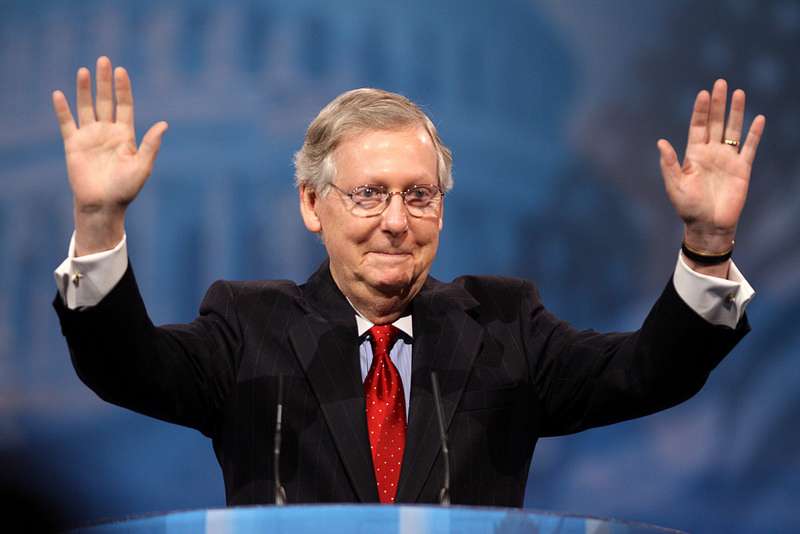Advice to the New Republican Congress: Don't Pass More Laws
GOP should put the wish lists away and let state and local governments manage themselves.


The smartest minds on the center-right are circulating lists of legislation for the new Republican Congress to pass.
Columnist George Will has six proposals: abolish the Consumer Financial Protection Bureau, repeal the Independent Payment Advisory Board (part of ObamaCare), repeal the ObamaCare tax on medical devices, authorize the Keystone XL oil pipeline, pass the REINS Act, and mandate completion of a nuclear waste storage facility at Yucca Mountain in Nevada.
University of Tennessee law Professor Glenn Harlan Reynolds, who blogs as Instapundit, has his own list of six, published by USA Today. It starts with rolling the drinking age back to 18 (what better way to reduce the Democratic advantage in the youth vote?) and includes his brilliantly provocative "revolving door tax" that would punish federal employees who cash out by leaving the government to exploit their connections and obscure knowledge in lucrative private sector jobs.
Charles Krauthammer, for his part, proposes, "a bill a week for the first 10?weeks," including "a strong border security bill" and fast-track presidential trade negotiation authority. "Pass legislation," he advises the GOP.
Call me a contrarian, or accuse me of low expectations, but my idea of a successful Republican Congress isn't one that passes 10 new laws. It isn't one that passes six new laws, or five. In fact, we'd probably be lucky to get away with a Republican Congress that abstained from law-passing altogether.
We've got more than enough laws already. So many, in fact, that it's basically impossible for an American individual or business who wants to abide by the law to keep track of all of them.
Don't get me wrong. I'd be happy enough if a new Congress repealed some of the old, bad laws. I suppose they need to pass some budget to keep the soldiers from going barefoot. In my ideal world, there'd be some legislation cutting taxes, reforming welfare, increasing legal immigration, allowing oil and liquid natural gas exports, and reducing government spending and bureaucracy.
But setting "zero" as at least the symbolic goal for new laws in the new Congress would have the virtue of being humble. It would be a signal that Congress understands the law of unintended consequences: that actions intended to improve matters may wind up making them worse in ways initially unimagined. It would also be a signal that Congress understands the Tenth Amendment to the Constitution: "The powers not delegated to the United States by the Constitution, nor prohibited by it to the states, are reserved to the states respectively, or to the people." The authors of the Bill of Rights understood what today's politicians and pundits often forget, which is that Congressional inaction is an opportunity for state or local governments, for businesses, or for voluntary organizations. These smaller-scale efforts are less harmful if they fail, and if they succeed, they can be replicated.
Go through the news looking out for examples of the law of unintended consequences and for the principles of the Tenth Amendment in action, and they are everywhere.
The headlines are full of stories about fatalities and injuries resulting from malfunctioning automobile airbags. The New York Times has been crusading on the issue. It's something Times editorial writers might have considered back in the 1980s, when they were campaigning to have the government require the installation of the airbags in passenger cars as a safety measure. It's a classic case of unintended consequences.
Or, in respect of the Tenth Amendment, consider how states are navigating the issues of gay marriage and marijuana decriminalization in the absence of sweeping federal actions.
Or look at how state governments and regional authorities are moving to finance roads, bridges, and tunnels on their own or in partnership with the private sector, instead of waiting for federal spending. As As transportation innovatoin expert Kenneth Orski put it recently, "states are not standing idly by, waiting for Congress to come to the rescue with more money. Instead, governors, state legislatures, and local governments are taking aggressive steps to make themselves less dependent on federal aid." California, for example, replaced the eastern span of the San Francisco Bay Bridge in a $6.4 billion project.
Presidents and presidential candidates like to denounce do-nothing congresses. But the drafters of the legislative wish lists may want to be careful what they wish for. If the congressmen themselves aren't cautious, by the time they're done they'll have us all nostalgic for the good old days of gridlock.
Editor's Note: As of February 29, 2024, commenting privileges on reason.com posts are limited to Reason Plus subscribers. Past commenters are grandfathered in for a temporary period. Subscribe here to preserve your ability to comment. Your Reason Plus subscription also gives you an ad-free version of reason.com, along with full access to the digital edition and archives of Reason magazine. We request that comments be civil and on-topic. We do not moderate or assume any responsibility for comments, which are owned by the readers who post them. Comments do not represent the views of reason.com or Reason Foundation. We reserve the right to delete any comment and ban commenters for any reason at any time. Comments may only be edited within 5 minutes of posting. Report abuses.
Please to post comments




Well, okay, except a lot of laws need repealing. Technically, repeals are laws themselves.
Agreed, but we also need to pass a new budget, we are still on the 2009 one.
One law I would be in favor of Congress passing - term limits!
I once agreed with this, but I'm now of the opinion that what's needed isn't term limits for congresscritters but term limits for government bureaucrats.
Well, I'd prefer repeal of some of the imbecility - maybe curtailment of civil asset forfeiture, maybe IP reform. That said, I think even zero is optimistic. It's the Republican leadership we're talking about here.
Your lunch time derp:
Today I had to sit through a training session on import-export laws. When it was done, I asked the following for my own amusement:
If tariffs are needed to protect American jobs, wouldn't it be better just to ban imports?
If imports are necessary, what is the benefit of hindering them?
If imports are only useful up to a point, how do you determine that point?
The answer I got was basically "well, Top Men will figure it out."
The whole presentation was a vivid illustration of why smuggling exists.
Hazlitt said the mother of economic fallacies is to focus on the short-term and specific effects of a policy while ignoring the general and long-term effects.
On a side note, I for one wish that Lena Dunham shares her wit and wisdom with the world for many years to come (SFW):
http://uproxx.files.wordpress.......gif?w=650
Thanks.
You do know, there's no way any of us can unsee that, don't you?
Consider it your baptism by fire into the Derp Brotherhood.
The answer to all your questions is: because somebody or their cronies is making money from restricting trade. It's just legalized corruption. Top Men are lining their pockets.
I am reminded of Bastiat's tale of the Negative Railroad.
Sound more erudite than "rent seekers".
I can't see how following this advice won't lead to two years of the media using the phrase "Do Nothing Congress" till it's ringing in our ears.
It's PR suicide.
The media is going to attack the GOP Congress no matter what. I'm not sure they wouldn't even if Congress just went along with the administration.
Might as well be hanged for a sheep as for a lamb.
Don't let it keep you up at night. It will NEVER happen.
It's not like it matters, nothing on any of those lists is going to make it past the veto pen anyway. It's nothing but posturing and "continuing resolution" faux-fights until 2017.
Don't be stupid, Stoll. (Or is it, don't be stollpid, Stu?)
The best defense is a good offense. Trying to lose as slowly as possible assures only losing. People won't take aiming at 0 as symbolic of anything good, esp. since you acknowledge the need for some maintenance-type enactments anyway. It's not clear to me whether you're criticizing calls for repealer acts of Congress, although at least a superficial reading of your piece says, yes, you are.
The Congress should pass good laws. If Obama wants to veto and the Democrats in Congress want to refuse to override him, then it is on them. But even if the vetoes do stand, at least we will know each side's position.
Last I looked, not doing anything is not just being humble but another way of selling out your supporters. There is nothing inherently good or bad about passing laws. There is only good or bad in what those laws say.
There are a ton of good laws the GOP could pass ranging from the Keystone pipeline, to reforming the regulatory process, to curbing IRS abuses, to prohibiting the EPA from regulating carbon, just to name a few. If Obama wants to veto them, let him do so and let the Democrats in Congress accept whatever consequences come with voting against overriding those vetoes.
I do not understand how the GOP is doing itself or the country a favor by doing nothing. This article is absurd.
Yep. The end result after a bunch of Obama vetoes might be the same, but there are big political points to be made.
And actual conservatives are already pretty suspicious of the GOP. Doing nothing or stupid shit like fixing Obamacare will just convince them to stay home in 2 years.
I would love for the GOP to take a page from the Democrat playbook and name all their bills something like, "the defense of innocent children act", or "the protection of freedom from tyranny act". Then dare Obama to veto them.
How about the National Defense of Women Act....which would implement national reciprocity of concealed carry permits ?
"I do not understand how the GOP is doing itself or the country a favor by doing nothing."
In the long-run, it certainly didn't work for Harry Reid.
This article is absurd.
As cited in the article, all the good proposals are taken, so there's only one thing left: the anti-proposal. Smart pundits are preparing their to-do lists for January 2017 now. Last one to the internet's a rotten egg!
Krauthammer:
I can't see a lot of things I disagree with in Krauthammer's list, most of which lessen gov't regulation, except the border security suggestion. And the devil that comes with that is in the details.
I have to disagree. Reynold's list is actually fairly good; at least four of them are actions that restrict the power of the government over individuals (and what's wrong with that?). The revolving-door tax... eh, how is that constitutional even?
I would add to that list a law that reforms the criminal "justice" system in this country (along the lines of what Sen. Paul and other legislators have proposed).
Your honor, my client's decision to put ground glass and sand in the hamburger meat produced at his factory is clearly the FDA's fault!
When the FDA establishes minimum glass and sand content in hamburger meat, yeah, it kind of would be.
It takes passing a bill to repeal legislation, and there is a lot of legislation that should be repealed. You also need to pass a budget. Other than that I agree.
What we have is 50 sovereign little nations who pass even more laws and tax the hell out of their residents. There are exceptions such as Texas and Wyoming. Other than that, living in most states is not much of a break from the federal government. Perhaps we need to be divided into provinces, like Canada. Of course that would not save us from more laws or taxes in any event. Maybe we just need to divide up into different countries. Any ideas? How about Texas becoming a Republic again?
What's Mitch McConnell supposed to tell that long line of lobbyists outside his office door?
"Just another $100k from each of you and we can get this ball rolling."
"Does this color make me look less like a turtle?"
I think that going for a "net" of zero - one old law repealed for every new law enacted - would have a lot of public support. The Reynolds and Will lists meet the criterion. It might also have the benefit of forcing team red to actually think about liberty and a smaller federal presence in our lives.
I say this despite my belief that "doing nothing" is a rather high bar. Most of the congresses of my lifetime have done worse than nothing. I just think that if you promise that half of your actions would be to stop doing something stupid that was mandated in the past, you could do somewhat better. (There is a lot of low hanging fruit.)
Except that that's silly, because what counts as "a law"?
Yes, team blue can mince words and fall back of technical definitions to say that any act repealing a previous law is still a law. Let them. Make a reasonable list of the laws you have repealed and the laws you have passed. Let team blue sound like a bunch of bureaucrats. (a) It would be a good thing to do. (b) It would look good to the public.
It's time to start repealing laws, and ripping thousands of pages out of the Federal Register, and Code of Federal Regulations.
my best friend's mom makes $83 an hour on the internet . She has been laid off for 7 months but last month her pay check was $18803 just working on the internet for a few hours. this page.....
?????? http://www.payinsider.com
I want a law in place, for the next decade at least, to the effect that for any new law or regulation enacted, five must be repealed.